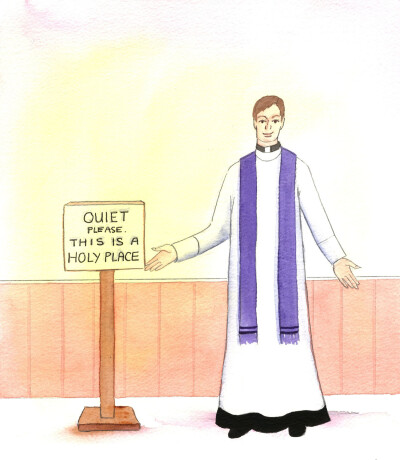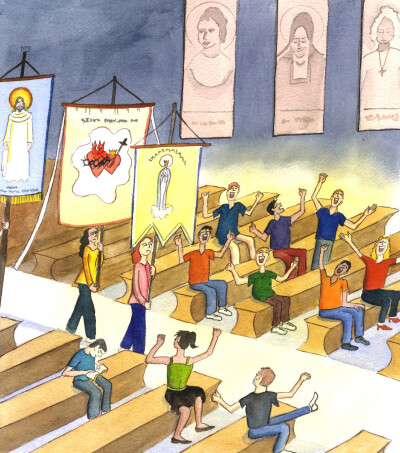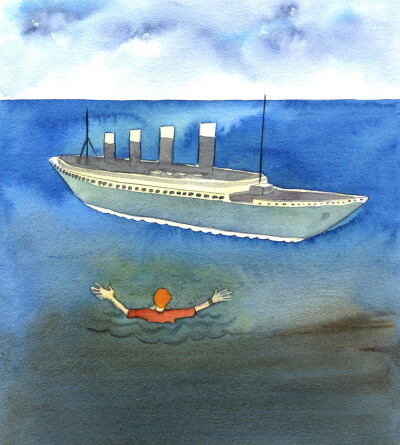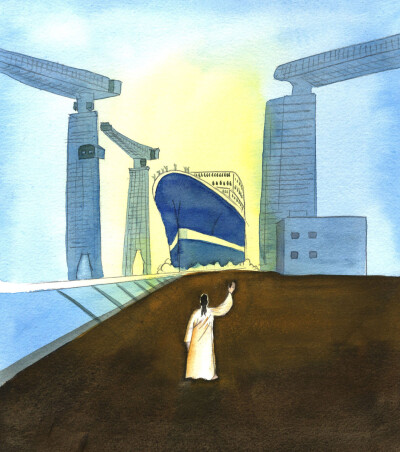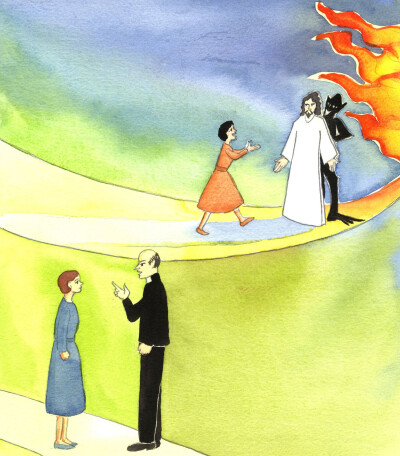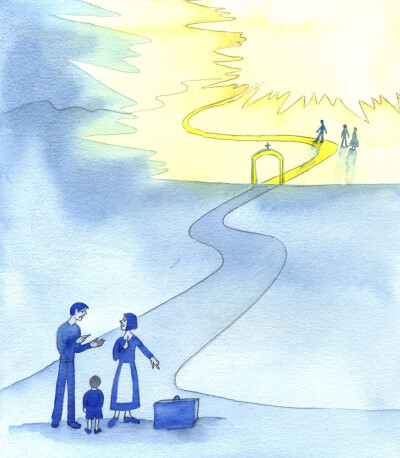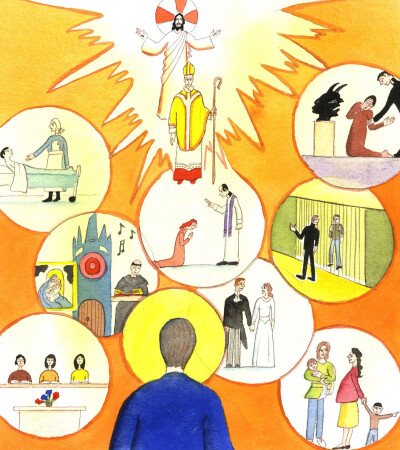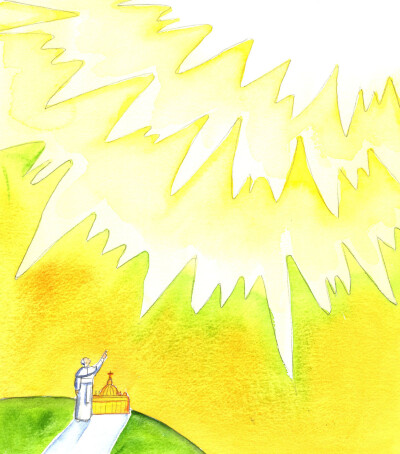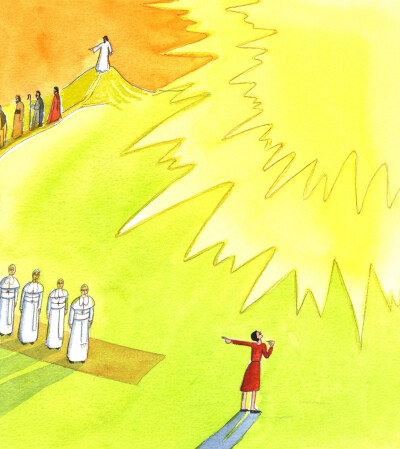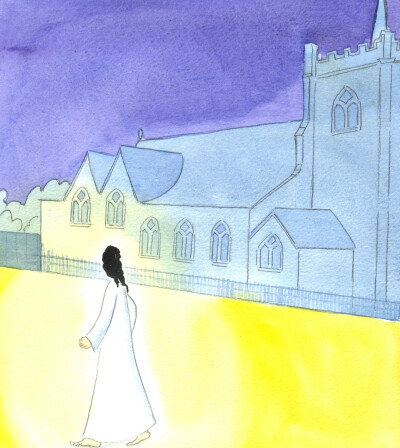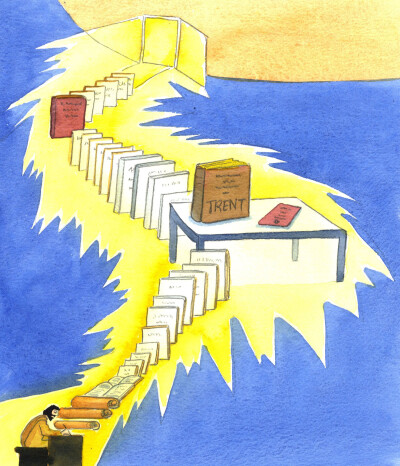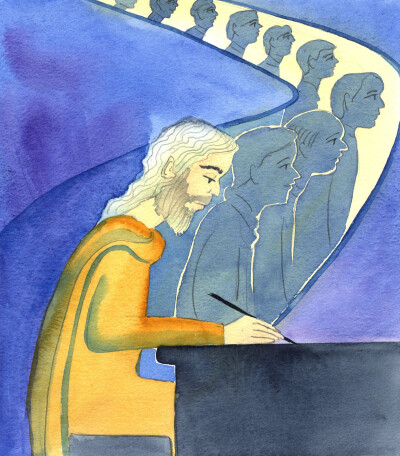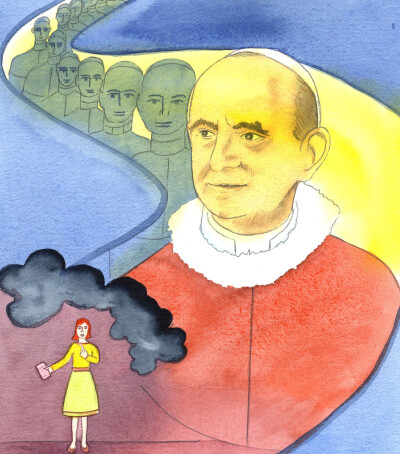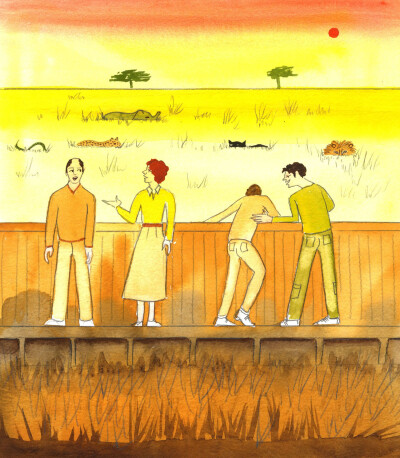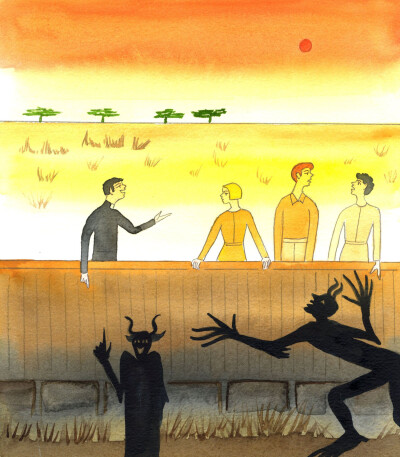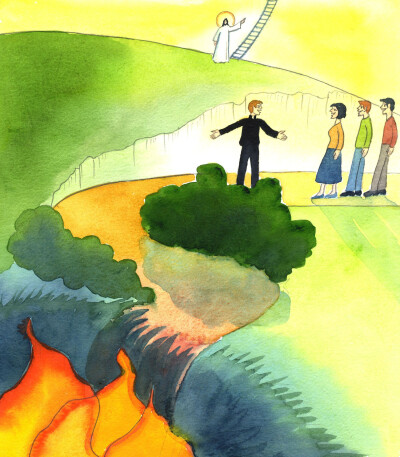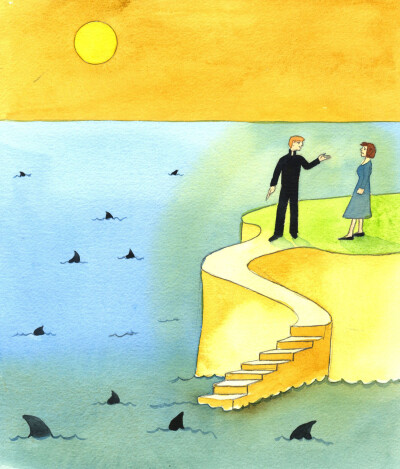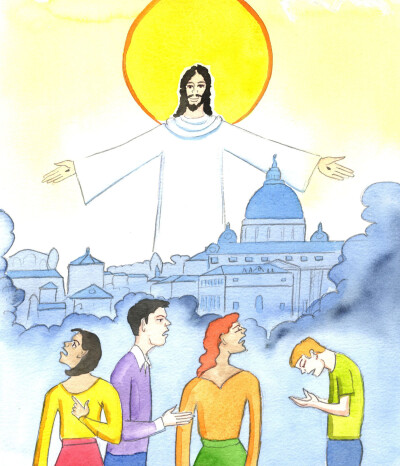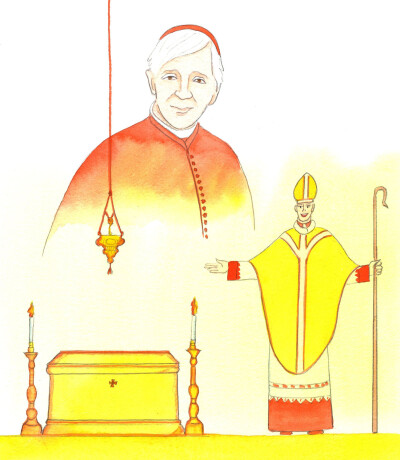Search Page
Showing 481 - 500 of 830
Plain churches, without images, encourage ordinary behaviour. Some of the Saints, to whom our churches are dedicated, would weep, if they could hear that noisiness, and see the disrespect shown by many Catholics in church. A wise priest in such circumstances puts out a notice, as a reminder.
When people are poorly-instructed about reverence, and when a church has few signs and images that indicate it is a sacred place, the faithful sometimes act, for a Mass, as if at a rally or a pop-concert. Even if a few pictures of the Saints are then put up around the walls, this is as effective as sticking a small plaster in a big wound. Change comes from clear instruction; and from effective signs of decoration at the entrance.
The Church is like an ocean-liner, launched by Christ. He sees that many people on board argue about the purpose of the ship, minimise the danger of travelling independently, and pour scorn on the dangers of the water. By such dissent, those passengers lead people astray. It is as if they were throwing other people into the water, so powerful is their influence Yet they will have to account for their irresponsible words.
The Catholic Church is like a great ship that was designed, built and launched by Jesus Christ, for everyone to find. Those fortunate people on board ought to live in peace with one another. It grieves Christ that some disturb others by loudly questioning the origin of the ship, its design, its purpose and goal, and the rules which all passengers must obey. They will be held to account for their behaviour.
In different parts of the world are Christians claiming to have Heavenly visions. All might seen sincere; some of these people might be trapped by their own lies, or some by the deceptions of Satan, or some be truly in touch with Christ. Obedience is the key in this; obedience to those in authority in the Church is a sign of love for God, and trust in Him and His Will.
Everyone who has visions in prayer should be very cautious, and seek the advice of those in authority in the Church. They can prove their love for God by their obedience. People who insist on what their 'visions' ask of them, even against the request of Church authorities, are in danger of being led astray. Some visions come from Satan, who loves to give pleasure if he can thereby draw people down to Hell.
A man can be living in the light, on his way to Heaven, yet the circumstances of a person's childhood can bring about patterns of behaviour which can be hard to eradicate, even after a sincere conversion, and membership of the Church. Even people of goodwill often continue to speak with sarcasm, or brutal honesty, or self-pitying or attention-seeking phrases learned as children.
Wherever Catholics live out their faith with goodness and conviction, they have an effect upon their culture, as Catholics have since the earliest times. The Bishops hand on the truth from Jesus Christ, people are forgiven and transformed, freed from superstition, men and women are equal in marriage, the sick are cherished and not rejected, prisoners receive justice, little girls are educated, children are valued, even the unborn, the arts flourish - art, architecture, music and scholarship - and the Saints set an unparalleled example of goodness, in all sorts of ways.
God invites us to kneel in adoration. The Pope is right to encourage us to offer reverent praise to God the Father, Who is Creator of the whole Universe, greater than the Universe, and awesome in His attributes, and in the beauty of His loving nature. We owe the same praise to Christ His Son, Who is Present in every Catholic Church, and yet often receives praise that is banal, vain, irreverent, frivolous or mundane.
The Lord asks: "Who are these Catholics who dare to declare to the Father in Heaven: No, I know better than those you have placed in authority over us in the Church. I will not obey Your Laws which, in my view, are foolish!" We offend God if we are careless in our attitude and decisions about sexual morality and other matters.
If Christ were to walk through our towns, discerning the attitudes of the Catholics gathered within Catholic churches, He would see people at Mass for all sorts of reasons, and mixed motives - but He would be thrilled by the small number who are present because they love Him, long to be closer to Him, and strive to do His Will.
The eternal truths expressed in the writings of generations of Popes are for all people. The Lord has enlightened the Popes ever since St. Peter. Two great works that the Lord wants people to examine are the Catechism of the Council of Trent, and 'Of Human Life' by Pope Paul VI - and then, in recent days, the 'Catechism of the Catholic Church'.
St Peter, like Pope Paul VI, was fearless in teaching the truth. Christ chose Saint Peter to be the first leader of the Apostles: the first Pope. Christ intended the Church always to have a leader; and all through the ages, the teaching of the Popes had been of paramount importance - including the 1968 Encyclical entitled 'Humanae Vitae', about the wrongness of contraceptive use.
Some people trust in their own opinions instead of the Church's teachings. In God's eyes, Pope Paul VI is a great hero of the Church who re-stated, in 'Humanae Vitae', long standing truths and principles about married love and sexuality. Catholics who oppose his teaching are opposing the teachings of generations of Popes - and, indeed, the Will of God, Who teaches us through those in authority in the Church.
When dissenting Catholics voice their opinions, and encourage others to dispute the constant teachings of the Church on faith or morals, they act as irresponsibly as people on a safari, looking at wildlife from behind a protective fence, who urge other people to leap over the barrier, or who even, jokingly, make to push people over, saying: 'You won't come to any harm!'
When members of the Clergy, or theologians, or other people in the Church urge people to believe that behaviour once everywhere known as sinful is nowadays to be seen as reasonable or even good - such as contraceptive use, or sexual activity outside marriage - they endanger souls. To encourage people to sin is to help them on the way to Hell. The demons lie in wait for careless souls just as wild animals lie in wait for safari tourists who are foolish enough to leave the safety of the path.
We must avoid the 'broad road'. Those members of the Clergy, and other Catholics, who advise people that what the Church says is gravely sinful behaviour is not in fact sinful, or simply not worth making sacrifices to avoid, are encouraging people to walk along the broad road that leads to Hell. They risk sharing the fate of the people they have helped to commit mortal sin and who, if unrepentant at death, reach Hell.
A member of the Clergy - or anyone else - who shares his doubts about articles of faith, or invites others to disregard the Church's moral teachings, is like a man who invites someone to bathe in a shark-infested sea. To lead someone into sin is like delivering a person to the demons.
Christ our God teaches us, and helps us, through His Church; yet there are countless Catholics held back from holiness or lasting joy because of their fears: fears that, if they choose to believe and practice the Faith in its fullness, they won't be able to bear the loneliness, or persecution or ridicule, or lack of luxuries, or chastity, or the rejection of sinful pleasure; some fear God's future plans, unknown. Some fear having more children.
When someone speaks about the entrance into full communion with the Church of Cardinal Newman, he should not describe this merely as a stage in his spiritual journey but as Newman's doing the Will of God, Who invites everyone to enter the Catholic Church. Catholic Clergy must not be held back, by ecumenical friendships, from rejoicing in the Truth.
Showing 481 - 500 of 830

